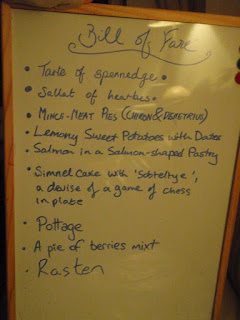The 2009-2010 session of the society was concluded with a feast. Using recipes from the fourteenth to the seventeenth centuries, participants prepared a delicious spread of medieval and early modern dishes. A lot of pastry was eaten.

After supping on pottage, the revellers devoured spiced mincemeat pies, spinach tarts, salmon (encased in salmon-shaped pastry) and a salad of herbs, before the table was cleared for apple and berry tart, rasten, and syllabub.
 Pastry Salmon
Pastry Salmon Rasten
Rasten
A civilised game of chess (with marzipan figures on a simnel-cake chessboard) descended into carnage as a queen was seized and promptly eaten. A similar fate awaited her companions.
 Simnel cake with marzipan chess pieces
Simnel cake with marzipan chess piecesSeveral short dramatic excerpts were then performed, bringing to a close the year's series of staged readings.
Scenes with a culinary emphasis were favoured, including Edel Semple's contribution of Act 2, scene 1 of Middleton's tragicomedy No wit/Help like a Woman's (c.1611). In this scene, the widow Lady Goldenfleece is treated to a banquet by her pompous suitor, Weatherwise. Edible astrological signs, probably made from marzipan and sugar, form the centrepiece of this feast and provide much material for bawdy humour.



